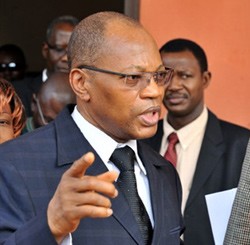Three basic schools in the Upper Manya Krobo District in the Eastern Region of Ghana, have benefited from a free exercise books distribution project by Dress a Kid Foundation, an online Charity group with the aim of supporting the less privileged. Dubbed ‘Project 1,000', the donation saw over 1,000 customized exercise books and other teaching and learning materials presented to about 500 pupils from the district .
According to the Foundation, the gesture is to relief some of the burden on parents who are finding it difficult to get basic school materials for their wards in the new academic year. Beneficiary schools included Kpeti Basic School, Kumankuma Anglican School and the Brepaw Upper Presbyterian School.
As part of the project, the Foundation also donated some clothing and shoes to the children in the deprived farming communities. Addressing a gathering of pupils, teachers and parents at Brepaw , the leader of Dress a Kid Foundation, Mr Attah-Effah Badu, said the project forms part of the group’s objectives to elicit smiles from the faces of children in deprived communities on quarterly basis.
He revealed that about 3,000 needy children in deprived communities and orphanages have so far benefited from the initiative since it was established some five years ago.
“Our initial aim was to provide one of the major necessities of life ,clothes to a minimum of hundred children every quarter of the year, due to our experiences at some of the communities and schools we visit, we raise stationery in addition to the clothes we donate,” Mr Attah-Effah said.
“To us at Dress a Kid Foundation, we believe we can be a blessing unto others if we can share with them the little we have. We may not be able to do all but we know with our little contribution, we are giving some children reasons to be happy,” he noted.
At Kumankuma, one of the communities the team visited, the Assemblyman of the area, Mr. Sam Martey, lauded the group for the gesture, and urged other benevolent organisations to do same. “We are surprised to see this team of young individuals embark on a journey of over 150 kilometres just to donate to the children of this community. It is a poor farming community and this donation came at the right time,” the Assemblyman who doubles as one of the two teachers in the school said.
Dress a Kid Foundation comprises young Facebook friends who have the passion to share.
The team has solely, and in partnership with other groups embarked on several outreach programmes which includes giving face-lifts to deprived schools.
Source :Citifmonline




















